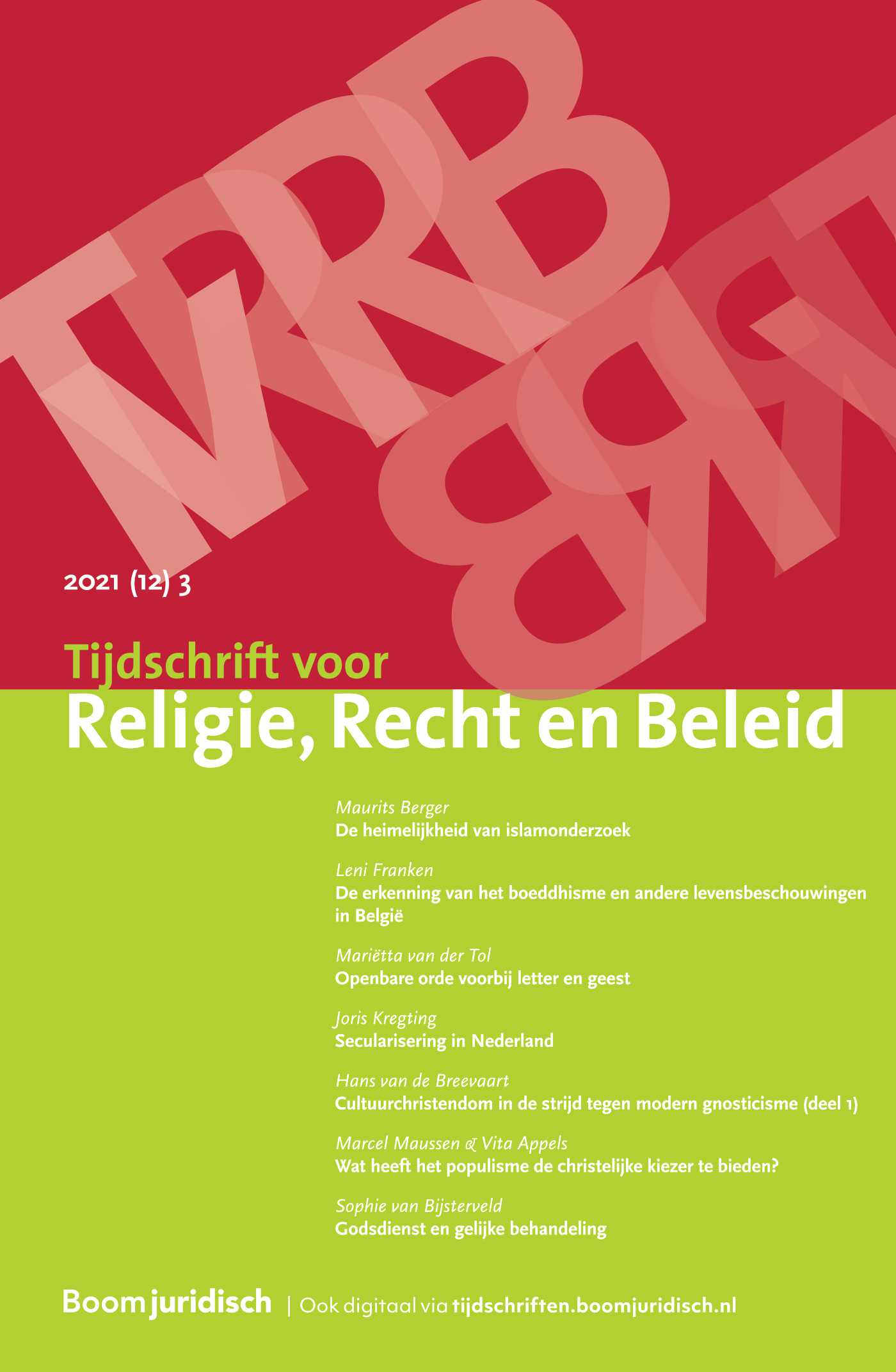|
This article argues that the increasingly negative attitude towards religion in Dutch society correlates with how the government understands the notion of citizenship. While citizenship used to be understood in a broad and liberal sense, the interpretation of the notion has been narrowed down. Nowadays, citizenship is understood in a cultural-nationalist way, with an emphasis on progressive values, especially concerning sexual-ethical themes. The article shows that the focus on a ‘sexular’ identity as characteristic of good citizenship carries important implications for dealing with religion and religious orthodoxy. A multi-dimensional interpretation of citizenship offers alternatives for an inclusive society |


Tijdschrift voor Religie, Recht en Beleid
Meer op het gebied van Algemeen
Over dit tijdschriftMeld u zich hier aan voor de attendering op dit tijdschrift zodat u direct een mail ontvangt als er een nieuw digitaal nummer is verschenen en u de artikelen online kunt lezen.
| Redactioneel |
Seculier fundamentalisme |
| Auteurs | Ben Koolen |
| Artikel |
Nederlands burgerschap op basis van een ‘sexuliere’ identiteitDe uitsluitende effecten van Nederlands integratiebeleid |
| Trefwoorden | burgerschap, Integratiebeleid, religieuze orthodoxie, Identiteit |
| Auteurs | Dr. Renée Wagenvoorde |
| SamenvattingAuteursinformatie |
| Artikel |
|
| Trefwoorden | Bekering, Asielzoeker, Vluchteling, Bekeerde christen |
| Auteurs | Mr. Kezia Haar en Mr. Gieneke Douma |
| SamenvattingAuteursinformatie |
|
A foreign national can be granted asylum if he has made it plausible that he is persecuted in his country for reasons related to religion. In order to make his asylum motives plausible, an applicant must declare consistently and coherently. There cannot be any doubt as to his identity or his asylum motives. A claimed convert has to declare convincingly about his conversion and has to demonstrate a broad knowledge of his Faith. Often, pastors and churches write testimonies stating the conversion is genuine. These letters are important, but never a decisive factor. |
| Artikel |
|
| Trefwoorden | dissenting opinions, Godsdienstvrijheid, margin of appreciation, EVRM |
| Auteurs | Prof. dr. Sophie van Bijsterveld |
| SamenvattingAuteursinformatie |
|
What divides the ECtHR in religion cases? Study of dissenting opinions in religion cases of the ECtHR sheds a light on dividing lines within the ECtHR and deepens our understanding of the methods of reasoning of the ECtHR itself. Following an analysis of dissenting opinions in religion cases in the rulings of the Grand Chamber of the ECtHR, this article focuses on the Chamber. As in the previous analysis, a clear pattern in the dividing lines is brought to light. This article discusses and evaluates this finding. |
| Artikel |
Het beoordelingskader van rituele jongensbesnijdenis |
| Trefwoorden | jongensbesnijdenis, Religieuze praktijken, godsdienstvrijheid, Religie en recht |
| Auteurs | Mr. Sohail Wahedi |
| SamenvattingAuteursinformatie |
|
What are the grounds to tolerate ritual male circumcision? This article elaborates on the legal and political assessment frameworks of male circumcision and answers the question whether and why ritual male circumcision should be tolerated in liberal democracies. |
| Artikel |
Waartoe is de Protestantse Kerk in Nederland op aarde?Haar toekomst volgens de nota Kerk 2025 |
| Trefwoorden | Protestantse Kerk in Nederland, kerk in de samenleving, krimpende kerk |
| Auteurs | Prof. dr. Herman Noordegraaf |
| SamenvattingAuteursinformatie |
|
The Protestant Church accepted in November 2015 a report about her future. This reflection was necessary because of the shrinking amount of members and of income. The report combines a principal view on the essence of being church with practical proposals to get a more simple organisation of the church and savings in expenditures. The responsibility of the church for society is explicitly stated. Much shall depend on the concrete follow up. Needed is more attention to the question how this responsibility can get shape. |
| Artikel |
Religie en de geestelijke infrastructuur van staat en samenlevingEen wijsgerige analyse aan de hand van Jürgen Habermas en G.W.F. Hegel |
| Trefwoorden | Religie, Samenleving, Staat, Habermas, Hegel, Publiekrecht |
| Auteurs | Mr. Dr. Bart Labuschagne |
| SamenvattingAuteursinformatie |
|
How can the debate on the place of religion in society in relation to the state, that has reached a deadlock in unbridgeable opposites, be drawn afloat again? In this contribution a lance will be broken for a philosophical approach to this issue. In view of an analysis of the main religious- and legal-philosophical work of two philosophical giants, the 19th Century German Idealist G.W.F. Hegel, and the contemporary Discourse theorist Jürgen Habermas, a double perspective will be cast on the central question of this debate. It will show surprising deep structures and sorely needed prospects. |

